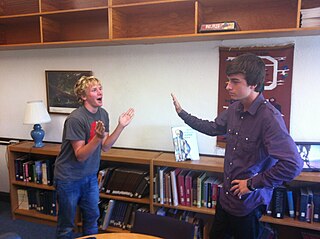 W
WEssex girl, as a pejorative stereotype in the United Kingdom, applies to a woman viewed as promiscuous and unintelligent, characteristics jocularly attributed to women from Essex. It is applied widely throughout the country and has gained popularity over time, dating from the 1980s and 1990s.
 W
WGaydar is a colloquialism referring to the intuitive ability of a person to assess others' sexual orientations as homosexual, bisexual or heterosexual. Gaydar relies on verbal and nonverbal clues and LGBT stereotypes, including a sensitivity to social behaviors and mannerisms like flamboyant body language, the tone of voice used by a person when speaking, overt rejections of traditional gender roles, a person's occupation, and grooming habits.
 W
WHella is an American slang term that originated in Oakland, California but has since spread to become native slang to all of the San Francisco Bay Area. It is used as an adverb such as in "hella bad" or "hella good" and was eventually added to the Oxford English Dictionary in 2002. It is possibly a contraction of the phrase "hell of a" or "hell of a lot [of]", in turn reduced to "hell of", though some scholars doubt this etymology since its grammatical usage does not align with those phrases. It often appears in place of the words "really", "a lot", "totally", "very", and in some cases, "yes". Whereas hell of a is generally used with a noun, according to linguist Pamela Munro, hella is primarily used to modify an adjective such as "good".
 W
WCyberspace is a concept describing a widespread interconnected digital technology. "The expression dates back from the first decade of the diffusion of the internet. It refers to the online world as a world 'apart', as distinct from everyday reality. In cyberspace people can hide behind fake identities, as in the famous The New Yorker cartoon." The term entered popular culture from science fiction and the arts but is now used by technology strategists, security professionals, government, military and industry leaders and entrepreneurs to describe the domain of the global technology environment, commonly defined as standing for the global network of interdependent information technology infrastructures, telecommunications networks and computer processing systems. Others consider cyberspace to be just a national environment in which communication over computer networks occurs. The word became popular in the 1990s when the use of the Internet, networking, and digital communication were all growing dramatically; the term cyberspace was able to represent the many new ideas and phenomena that were emerging.
 W
WLeet, also known as eleet or leetspeak, is a system of modified spellings used primarily on the Internet. It often uses character replacements in ways that play on the similarity of their glyphs via reflection or other resemblance. Additionally, it modifies certain words based on a system of suffixes and alternate meanings. There are many dialects or linguistic varieties in different online communities.
 W
W"Lipstick lesbian" is slang for a lesbian who exhibits a greater amount of feminine gender attributes, such as wearing make-up, dresses or skirts, and having other characteristics associated with feminine women. In popular usage, the term is also used to characterize the feminine gender expression of bisexual women, or the broader topic of female-female sexual activity among feminine women.
 W
WLOL, or lol, is an initialism for laughing out loud and a popular element of Internet slang. It was first used almost exclusively on Usenet, but has since become widespread in other forms of computer-mediated communication and even face-to-face communication. It is one of many initialisms for expressing bodily reactions, in particular laughter, as text, including initialisms for more emphatic expressions of laughter such as LMAO and ROFL or ROTFL. Other unrelated expansions include the now mostly obsolete "lots of luck" or "lots of love" used in letter-writing.
 W
W"Talk to the hand" is a slang phrase associated with the 1990s. It originated as a sarcastic way of saying one does not want to hear what the person who is speaking is saying.